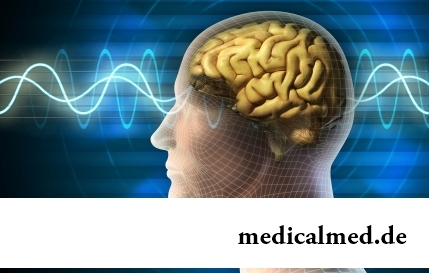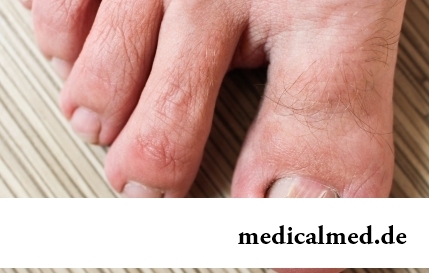





Muscular weakness
Muscular weakness is a frequent problem with which patients see doctors of different specialties. In medicine  the term muscular weakness means reduction of the muscle strength estimated objectively. Extent of this defeat can be various. Paralysis represents total absence of autokinesias in any group of muscles. Weakening of such movements is called paresis.
the term muscular weakness means reduction of the muscle strength estimated objectively. Extent of this defeat can be various. Paralysis represents total absence of autokinesias in any group of muscles. Weakening of such movements is called paresis.
Reasons of muscular weakness
Muscular weakness can accompany absolutely different diseases. Usually such complaint is read on reception at the neurologist or the therapist. Often patients mean fatigue, decrease in sensitivity, difficulty of the movement and even decrease in the general vitality. Adults are disturbed more by muscular weakness in legs. It is known that heart failure is shown in emergence of an asthma and reduction of ability to perform physical activity, even walking. A part of patients incorrectly interprets this state as muscular weakness. The deforming osteoarthrosis of large joints significantly reduces amplitude of the movement in them that too promotes reduction of transferable loadings and can be perceived as weakness in muscles. At adults exchange disturbances, including a diabetes mellitus 2 types are eurysynusic. This disease is followed by diabetic polyneuropathy at which peripheral neurons most often are surprised, and muscular weakness in legs appears. All these reasons of muscular weakness, generally appear after forty years. At the child muscular weakness speaks about pathology of a nervous system more often. The first minutes of life the pediatrician estimates the newborn's condition, including a tone of muscles. Decrease in a tone is connected with birth trauma and other reasons. So, the reasons of muscular weakness are various. Diseases of nervous tissue (the central and peripheral nervous system), endocrine disturbances (adrenal insufficiency, a thyrotoxicosis, a hyperparathyreosis), other states (a dermatomyositis or a polymiositis, muscular dystrophies, mitochondrial myopathies, hysteria, botulism, various poisonings, anemia) can be them.
Diagnosis of a disease
For clarification of the reason of muscular weakness full examination of the patient is conducted. The doctor talks to the patient: finds out when for the first time there were symptoms of muscular weakness that influences displays of a disease in what groups of muscles defeat is localized. Besides, for diagnosis earlier postponed diseases, heredity on neurologic diseases and the accompanying symptoms matter. Further the general objective inspection of the patient and a research of muscles is performed. At an evaluation stage of muscles determine the volume of muscular tissue, symmetry of its arrangement, turgor of fabrics. Assessment of tendon jerks is obligatory. Expressiveness of a reflex is estimated on the scale having six gradation (lack of reflexes, decrease in reflexes, norm, increase, a passing clonus, a steady clonus). It is necessary to consider that at the healthy person superficial reflexes (for example, belly) can be absent, and the Babinski's reflex is norm at newborns. Muscle strength is estimated on a special scale. Lack of muscular contractions  corresponds on it to zero, and a full animal force – to five points. Points from one to four estimate different extent of decrease in an animal force. At damage of the central nervous system weakness is shown in the extremity opposite to the center of defeat in a brain. So, if the stroke occurred in the left hemisphere, paresis and paralyzes develop in the right extremities. In hands razgibatel suffer more, than muscles sgibatel. In the lower extremities usually all on the contrary. At damage of the central part of the nervous system (a head and spinal cord), weakness is followed by increase in a muscle tone, revival of deep tendon jerks, emergence of pathological reflexes (Goffman, Babinsky). At defeat of a peripheral nervous system weakness is limited to defeat of a zone of an innervation of a specific nerve; muscle tone always low; deep reflexes are weakened or are absent. Bystry twitchings of bunches of muscles (fastsilyation) can sometimes be observed. For specification of the diagnosis some functional trials can be carried out: the patient ask to make this or that movement.
corresponds on it to zero, and a full animal force – to five points. Points from one to four estimate different extent of decrease in an animal force. At damage of the central nervous system weakness is shown in the extremity opposite to the center of defeat in a brain. So, if the stroke occurred in the left hemisphere, paresis and paralyzes develop in the right extremities. In hands razgibatel suffer more, than muscles sgibatel. In the lower extremities usually all on the contrary. At damage of the central part of the nervous system (a head and spinal cord), weakness is followed by increase in a muscle tone, revival of deep tendon jerks, emergence of pathological reflexes (Goffman, Babinsky). At defeat of a peripheral nervous system weakness is limited to defeat of a zone of an innervation of a specific nerve; muscle tone always low; deep reflexes are weakened or are absent. Bystry twitchings of bunches of muscles (fastsilyation) can sometimes be observed. For specification of the diagnosis some functional trials can be carried out: the patient ask to make this or that movement.
Treatment of muscular weakness
After establishment of the diagnosis, the doctor chooses treatment of muscular weakness according to modern recommendations. If pathology of a nervous system became the reason of muscular weakness, therapy is carried out by the neuropathologist. Physiotherapy exercises, massage, physiotreatment, symptomatic therapy, trombolitik, neuroprotectors, vitamins and other drugs can be used. At the child muscular weakness the children's neurologist and the pediatrician reveal and treat.
Average life expectancy of lefthanders is less, than right-handed persons.

The hysteromyoma is diagnosed more than at a third of women 35 years are more senior. This high-quality new growth, which on early a stage...
Section: Articles about health
The phenomenon of improvement of a condition of the patients at administration of drugs who are not containing active agents, so-called effect of placebo is known long ago. At the end of the 18th century the American doctor Perkins began to treat people the "miracle" sticks made of a spl...
Section: Articles about health
There is a lot of fans of beer in our country. Statistically, on each average Russian (including women and children) in a year about 60 liters of this drink are consumed. It is not a lot of, as in the Czech Republic or Germany, but figure all the same impressive. There is nothing to rejoice here: despite assurances of producers that beer is absolutely harmless, effects of its active consumption cannot be considered positive in any way. Here only part of that negative impact, which popular нап...
Section: Articles about health
There is an opinion that at low temperatures safety of products is ensured longer and better thanks to what the refrigerator considers...
Section: Articles about health
We present to yours the TOP of the medicamentous means exerting the stimulating impact on a potentiality, i.e. on ability of the man to commission of sexual intercourse. At once it is necessary to tell that not always disturbances of erectile function can be eliminated with reception of t...
Section: Articles about health
The medicine promptly develops, and the fact that else quite recently it seemed by miracle can now. We are not surprised any more to the fact that people with artificial joints and extremities can play sports, organ transplantation became a routine, and the latest cancer medicine allowed to achieve reduction of mortality in tens of times. Miracles of plastic surgery thanks to which people in 60 years are in the flower of beauty and freshness, too not a sensation any more....
Section: Articles about health
Several decades ago the basil (the district khan, реан, Reagan) was considered as a part of the Caucasian or east cuisine, but today it is strong for...
Section: Articles about health
For anybody not a secret that the modern person eats not as his ancestors. For the last 100 years in broad access there were absolutely new products which are result of use of the latest technologies in food production. Significantly changed спо...
Section: Articles about health
Diapers for adults – individual one-time means of hygiene which in some situations is irreplaceable and from such situations any person is not insured. Though nobody perceives need of their use with enthusiasm, however without such means already problematic situation could be heavier....
Section: Articles about health
EKO, or extracorporal fertilization - a method of treatment of infertility which became the reason of a set broken mines in due time...
Section: Articles about health
It is impossible to imagine human life in which there would be no plants. Practically in each apartment and any production room there are window plants, millions of people with pleasure are engaged in gardening and truck farming, many citizens пр...
Section: Articles about health
There comes the season of issues. Many Russians already dream of outdoor recreation, trips, beautiful seaside beaches. At this time there is no wish to think of problems with health and other unpleasant things, however there are subjects which require attention. In the summer repeatedly the risk increases to ache with some very dangerous illnesses, we also will talk about them today....
Section: Articles about health
Producers of milk mixes for children assure: mixes are ideally balanced and adapted for needs of babies. In a sluch...
Section: Articles about health
The brain of the person is studied not one hundred years, but the quantity of the riddles connected with this body increases rather, than decreases. Perhaps, numerous delusions concerning a structure and functioning of a brain, many are explained by it from...
Section: Articles about health
Each person supports all life a SARS about 200 times. The peak of incidence falls on cold season, but it is possible to get sick with a temperature and a pharyngalgia, and sometimes and very possibly, even during a heat. The reasons for development of catarrhal diseases there is a set: from the weakened immunity till an excess portion of ice cream....
Section: Articles about health
Residents of big cities quite often have a disease which is known as the syndrome of chronic fatigue (SCF) today. This illness...
Section: Articles about health
The pancreas performs two functions in a human body: release of enzymes without which digestion of carbohydrates, fats and proteins, and a producing hormones is impossible. The most important of them - insulin, is the main participant of carbohydrate metabolism, a normal...
Section: Articles about health
Climax - process of fading of reproductive function of an organism in process of its aging. At women the main sign of its approach is the termination of a menstrual cycle. Officially the menopause is diagnosed when periods are not observed within 12 months. Age changes quite often are followed by emotional failures, disturbance of thermal control and sweating, dizzinesses and headaches, tachycardia and other unpleasant phenomena. This complex of symptoms...
Section: Articles about health
Season of activity of viral infections in the heat. Everyone can get sick, but probability of this unpleasant event it is possible and it is necessary miny...
Section: Articles about health
Scientists always aimed to offer fundamental explanations for medical problems. Their theories formed the basis of modern methods of treatment of the hardest pathologies and helped to save a set of lives. However stories are known also such theoretical constructions, following to...
Section: Articles about health
Color of plants is caused by presence at them of certain chemical compounds. Let's talk about what is meant by various colors of vegetables and fruit and what properties they give them....
Section: Articles about health
The depression not without reason is considered one their main troubles of our century: for scientific and technical progress, acceleration of rate of life and a surplus...
Section: Articles about health
Any person who faced a disease knows that treatment costs expensive. It belongs also to consultations of qualified specialists, and to the diagnostic procedures which are not included in the list of obligatory medical services. Question of cost of medicinal Wednesday...
Section: Articles about health
All got used long ago that, having addressed the plastic surgeon, it is possible to modify natural parameters of a figure or to minimize the damages put to appearance with ruthless time. Many people (preferential women) worldwide annually decide on operations such. However there are also much more exotic interventions which are carried out seldom so far and cost expensive very much. We bring the story about the most unusual of them to your attention....
Section: Articles about health
The word "onikhokriptoz" is unfamiliar to most of people, meanwhile quite so physicians call very widespread problem: growing...
Section: Articles about health
Coffee – favourite drink of many. For the last decades it more than once already declared very harmful, extremely useful and even necessary for normal life activity. In spite of the fact that this product became for us usual for a long time, exists much...
Section: Articles about health
For the time being the perspective of heart diseases seems to most of people remote and foggy. But sooner or later practically each adult faces extremely unpleasant feelings: sudden stethalgia. To be consoled at this time in a thought of what for a heart attack still early, will hardly turn out: if the person is impressionable, he, as a rule, has feeling of panic and fear of fast death. And meanwhile, it is very often possible to confuse pains with cardiac pains невралгическог...
Section: Articles about health
